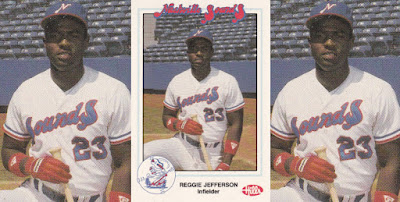His career winding down in 2001, Reggie Jefferson looked back on his years in baseball, years that could have been better but for injuries.
"I've always seemed to get injured at the most inopportune times," Jefferson told the Beaver County Times in March 2001, as he tried to catch on with Pittsburgh. "I think my career could have been a lot different if I hadn't been injured so many times."
Jefferson's career would have been different. The once-highly-touted prospect might have even stayed with his original club but for an injury, or a sickness, and a clerical error.
Jefferson's original team was the Reds. He was taken by Cincinnati in the third round of the 1986 draft. He made AA Chattanooga in 1989, hitting three home runs in one July game for Chattanooga. He made AAA Nashville in 1990.
In February 1990, a columnist for a Kentucky newspaper branded Jefferson a super prospect.
"Reggie Jefferson. Write it down: switch-hitter, first baseman, blue-chip Major League prospect," the columnist for the Bowling Green Daily News wrote.
He made Cincinnati in May 1991, hitting a home run in his first major league start.
It was the next month that Jefferson got sick, then he got traded. Reds general manager Bob Quinn had intended to put Jefferson on the disabled list. Instead, Quinn placed Jefferson on the designated for assignment list.
The move meant Jefferson could become a free agent and the Reds could lose a top prospect for nothing. It also resulted in Jefferson being traded to Cleveland.
Jefferson spent parts of three seasons with Cleveland, before moving on to Seattle, then Boston. He hit .347 for Boston in 1996 and .319 in 1997. But he had a weakness, it was left handers.
In one August 1997 game, Jefferson was going well, until Boston manager Jimy Williams pinch hit for hm.
"It's just making me sick," Jefferson told the Boston Globe. He had done well earlier in the game. "We're winning 8-2 and I get pinch-hit for against a lefty."
The rift grew to its breaking point in October 1999. Jefferson, who hit .277 on the year, was left off the post-season roster. He then left town. He had played his last major league game.
But he still had baseball left in him. He signed the next year with Japan's Seibu Lions.
"My idea is to play for a year," Jefferson told the Boston Globe in April 2000. "If nothing else, it will be a good cultural experience. The worst I can do is come back in good shape and get an offer to play in somebody's game."
But, while he tried out for the Pirates in 2001, he didn't make the team. His career was done. Jefferson has since tried his hand at coaching. He coached in 2005 for AAA Albuquerque and in 2006 at the University of South Florida.
Jefferson's career would have been different. The once-highly-touted prospect might have even stayed with his original club but for an injury, or a sickness, and a clerical error.
Jefferson's original team was the Reds. He was taken by Cincinnati in the third round of the 1986 draft. He made AA Chattanooga in 1989, hitting three home runs in one July game for Chattanooga. He made AAA Nashville in 1990.
In February 1990, a columnist for a Kentucky newspaper branded Jefferson a super prospect.
"Reggie Jefferson. Write it down: switch-hitter, first baseman, blue-chip Major League prospect," the columnist for the Bowling Green Daily News wrote.
He made Cincinnati in May 1991, hitting a home run in his first major league start.
It was the next month that Jefferson got sick, then he got traded. Reds general manager Bob Quinn had intended to put Jefferson on the disabled list. Instead, Quinn placed Jefferson on the designated for assignment list.
The move meant Jefferson could become a free agent and the Reds could lose a top prospect for nothing. It also resulted in Jefferson being traded to Cleveland.
Jefferson spent parts of three seasons with Cleveland, before moving on to Seattle, then Boston. He hit .347 for Boston in 1996 and .319 in 1997. But he had a weakness, it was left handers.
In one August 1997 game, Jefferson was going well, until Boston manager Jimy Williams pinch hit for hm.
"It's just making me sick," Jefferson told the Boston Globe. He had done well earlier in the game. "We're winning 8-2 and I get pinch-hit for against a lefty."
The rift grew to its breaking point in October 1999. Jefferson, who hit .277 on the year, was left off the post-season roster. He then left town. He had played his last major league game.
But he still had baseball left in him. He signed the next year with Japan's Seibu Lions.
"My idea is to play for a year," Jefferson told the Boston Globe in April 2000. "If nothing else, it will be a good cultural experience. The worst I can do is come back in good shape and get an offer to play in somebody's game."
But, while he tried out for the Pirates in 2001, he didn't make the team. His career was done. Jefferson has since tried his hand at coaching. He coached in 2005 for AAA Albuquerque and in 2006 at the University of South Florida.
- Orlando Sentinel, July 18, 1989: Jefferson's 3 Homers Power Chattanooga Past Orlando
- Bowling Green Daily News, Feb. 23, 1990: Reds have super prospect
- Toledo Blade, Associated Press, May 21, 1991: Reds make room for rookie at first
- Boca Raton News, New York Daily News, June 18, 1991: Reds' Quinn under fire for error on top prospect
- Los Angeles Times, Boston Globe, Aug. 14, 1997: Jefferson Makes His Declaration of Dependence
- Chicago Tribune, Boston Globe, April 30, 2000: Going Distance For A Job
- Beaver County Times, March 11, 2001: Jefferson hopes to make noise after quiet arrival with Bucs



No comments:
Post a Comment